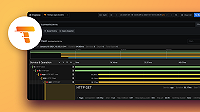Configure TLS communication
Tempo can be configured to communicate between the components using Transport Layer Security, or TLS.
Note
The ciphers and TLS version here are for example purposes only. We are not recommending which ciphers or TLS versions for use in production environments.
Server configuration
This sample TLS server configuration shows supported options.
server:
tls_cipher_suites: TLS_ECDHE_RSA_WITH_AES_128_GCM_SHA256,TLS_ECDHE_RSA_WITH_AES_256_GCM_SHA384,TLS_ECDHE_ECDSA_WITH_AES_128_GCM_SHA256,TLS_ECDHE_ECDSA_WITH_AES_256_GCM_SHA384
tls_min_version: VersionTLS12
grpc_tls_config:
cert_file: /tls/tls.crt
key_file: /tls/tls.key
client_auth_type: VerifyClientCertIfGiven
client_ca_file: /tls/ca.crt
http_tls_config:
cert_file: /tls/tls.crt
key_file: /tls/tls.key
client_auth_type: VerifyClientCertIfGiven
client_ca_file: /tls/ca.crtValid values for the client_auth_type are documented in the standard crypt/tls package under ClientAuthType here.
Client configuration
Several components of Tempo need to configure the gRPC clients they use to communicate with other components. For example, when the querier contacts the query-frontend to request work, the client in use must enable TLS if the server is serving a TLS endpoint.
The Tempo configuration uses a standard configuration stanza for each of these client configurations. Below is an example of the configuration.
The optional configuration elements tls_min_version, tls_cipher_suites, and tls_insecure_skip_verify may be omitted. The option tls_server_name may or may not be required, depending on the environment.
grpc_client_config:
tls_enabled: true
tls_cert_path: /tls/tls.crt
tls_key_path: /tls/tls.key
tls_ca_path: /tls/ca.crt
tls_server_name: tempo.trace.svc.cluster.local
tls_insecure_skip_verify: false
tls_cipher_suites: TLS_ECDHE_RSA_WITH_AES_128_GCM_SHA256,TLS_ECDHE_RSA_WITH_AES_256_GCM_SHA384,TLS_ECDHE_ECDSA_WITH_AES_128_GCM_SHA256,TLS_ECDHE_ECDSA_WITH_AES_256_GCM_SHA384
tls_min_version: VersionTLS12The configuration block needs to be set at the following configuration locations.
ingester_client.grpc_client_configmetrics_generator_client.grpc_client_configquerier.query-frontend.grpc_client_config
Additionally, memberlist must also be configured, but the client configuration is nested directly under memberlist as follows. The same configuration options are available as above.
memberlist:
tls_enabled: true
tls_cert_path: /tls/tls.crt
tls_key_path: /tls/tls.key
tls_ca_path: /tls/ca.crt
tls_server_name: tempo.trace.svc.cluster.local
tls_insecure_skip_verify: falseReceiver TLS
Additional receiver configuration can be added to support TLS communication for traces being sent to Tempo. The receiver configuration is pulled in from the Open Telemetry collector, and is documented upstream here. Addition TLS configuration of OTEL components can be found here.
An example tls block might look like the following:
tls:
ca_file: /tls/ca.crt
cert_file: /tls/tls.crt
key_file: /tls/tls.key
min_version: "1.2"The above structure can be set on the following receiver configurations:
distributor.receivers.otlp.protocols.grpc.tlsdistributor.receivers.otlp.protocols.http.tlsdistributor.receivers.zipkin.tlsdistributor.receivers.jaeger.protocols.grpc.tlsdistributor.receivers.jaeger.protocols.thrift_http.tls
Configure TLS with Helm
To configure TLS with the Helm chart, you must have a TLS key-pair and CA certificate stored in a Kubernetes secret.
The following example mounts a secret called tempo-distributed-tls into the pods at /tls and modifies the configuration of Tempo to make use of the files.
In this example, the Tempo components share a single TLS certificate.
Note that the tls_server_name configuration must match the certificate.
compactor:
extraVolumeMounts:
- mountPath: /tls
name: tempo-distributed-tls
extraVolumes:
- name: tempo-distributed-tls
secret:
secretName: tempo-distributed-tls
distributor:
extraVolumeMounts:
- mountPath: /tls
name: tempo-distributed-tls
extraVolumes:
- name: tempo-distributed-tls
secret:
secretName: tempo-distributed-tls
ingester:
extraVolumeMounts:
- mountPath: /tls
name: tempo-distributed-tls
extraVolumes:
- name: tempo-distributed-tls
secret:
secretName: tempo-distributed-tls
memcached:
extraArgs:
- -Z
- -o
- ssl_chain_cert=/tls/tls.crt,ssl_key=/tls/tls.key
extraVolumeMounts:
- mountPath: /tls
name: tempo-distributed-tls
extraVolumes:
- name: tempo-distributed-tls
secret:
secretName: tempo-distributed-tls
metricsGenerator:
extraVolumeMounts:
- mountPath: /tls
name: tempo-distributed-tls
extraVolumes:
- name: tempo-distributed-tls
secret:
secretName: tempo-distributed-tls
querier:
extraVolumeMounts:
- mountPath: /tls
name: tempo-distributed-tls
extraVolumes:
- name: tempo-distributed-tls
secret:
secretName: tempo-distributed-tls
queryFrontend:
extraVolumeMounts:
- mountPath: /tls
name: tempo-distributed-tls
extraVolumes:
- name: tempo-distributed-tls
secret:
secretName: tempo-distributed-tls
tempo:
readinessProbe:
httpGet:
scheme: HTTPS
structuredConfig:
memberlist:
tls_ca_path: /tls/ca.crt
tls_cert_path: /tls/tls.crt
tls_enabled: true
tls_key_path: /tls/tls.key
tls_server_name: tempo-distributed.trace.svc.cluster.local
distributor:
receivers:
otlp:
protocols:
grpc:
tls:
ca_file: /tls/ca.crt
cert_file: /tls/tls.crt
key_file: /tls/tls.key
ingester_client:
grpc_client_config:
tls_ca_path: /tls/ca.crt
tls_cert_path: /tls/tls.crt
tls_enabled: true
tls_key_path: /tls/tls.key
tls_server_name: tempo-distributed.trace.svc.cluster.local
cache:
caches:
- memcached:
consistent_hash: true
host: tempo-distributed-memcached
service: memcached-client
timeout: 500ms
tls_ca_path: /tls/ca.crt
tls_cert_path: /tls/tls.crt
tls_enabled: true
tls_key_path: /tls/tls.key
tls_server_name: tempo-distributed.trace.svc.cluster.local
roles:
- parquet-footer
- bloom
- frontend-search
metrics_generator_client:
grpc_client_config:
tls_ca_path: /tls/ca.crt
tls_cert_path: /tls/tls.crt
tls_enabled: true
tls_key_path: /tls/tls.key
tls_server_name: tempo-distributed.trace.svc.cluster.local
querier:
frontend_worker:
grpc_client_config:
tls_ca_path: /tls/ca.crt
tls_cert_path: /tls/tls.crt
tls_enabled: true
tls_key_path: /tls/tls.key
tls_server_name: tempo-distributed.trace.svc.cluster.local
server:
grpc_tls_config:
cert_file: /tls/tls.crt
client_auth_type: VerifyClientCertIfGiven
client_ca_file: /tls/ca.crt
key_file: /tls/tls.key
http_tls_config:
cert_file: /tls/tls.crt
client_auth_type: VerifyClientCertIfGiven
client_ca_file: /tls/ca.crt
key_file: /tls/tls.key
traces:
otlp:
grpc:
enabled: trueRefer to the
prometheus.scrape docs for Alloy to configure TLS on the scrape.
A relabel configuration like the following will do this configuration for you dynamically.
{
source_labels: ['__meta_kubernetes_pod_annotation_prometheus_io_scheme'],
action: 'replace',
target_label: '__scheme__',
regex: '(https?)',
replacement: '$1',
},

